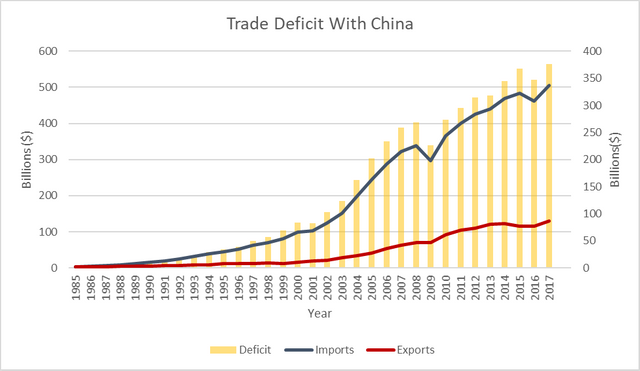Qualitative look at what happens when tariffs are imposed
The imposition of tariffs aimed at China will lead to vulnerability in the American markets (recession). The purpose of the tariffs are to decrease the trade deficit between the United States and China, and looking longer-term to have America obtain a balance in terms of production and consumption.
It’s true that the tariffs would lead to a decrease in the trade deficit even with China’s retaliation of tariffs of their own. However, with the implication of tariffs the US economy will get into a cycle that ultimately will lead to a recession. The economy will slow down due to higher levels of inflation from the increase in the price of consumer goods, which then causes for a decrease in consumer spending, leading to corporations having to cut costs (ultimately leading to higher unemployment). It’s a cycle that continues to fuel itself and cause harm on the US economy and eventually increasing chances of a recession (in the current state of the economy).

Figure (1)
It’s important to understand the impacts of these tariffs on an already inflated economy (bubble). When companies are taxed for the product that they are supplying, the costs (tax) must be taken on by both the consumer and supplier. Suppliers will have to eat into their original earnings to remain profitable. This will cause the suppliers to cut costs internally and raise prices externally to remain profitable. Cutting internal costs will result in downsizing while raising costs externally will result in lower demand of the produced good by the consumer, the combination will cause higher inflation. Ultimately the consumer is the one getting the short end of the stick. The consumer will have to pay higher costs for the same goods (inflation), which will result in a lower demand of those goods which leads to the slowing down of the economy through a decrease in consumer spending. Once consumer spending decreases it will have an effect on the US economy as corporations’ overall profits and earnings decrease.
Once corporations earnings start to decrease they end up having to cut costs leading to a deceleration in job growth and eventually unemployment. When government gets involved in the free market it causes for a cycle of economic disparity. Corporations have to adjust to new regulations that are forced upon them to remain profitable which lead to higher prices (inflation), lower consumer demand and spending and ultimately the consumer is the one left paying for this. The cycle will go on and will slowly but surely decrease overall economic growth.
This was a qualitative analysis of how the tariffs will end up putting the US economy in a position of vulnerability in terms of an upcoming recession. It shows that it is the consumer who ends up paying more with the tariffs in play. Without considering the current economic bubble the States are in, the implication of tariffs will surely decrease economic growth and increase the likelihood of the United States falling into a recession. More articles on why a recession is near regarding the bond market, student debt and foreign markets will come soon!
About me: My name is Lahiru Fernando, I go by Roo and I’ve just graduated with a Physics degree from Oregon State University. In the beginning of this year I started to learn about the financial markets and I can’t get enough! I’m on a journey in understanding global markets and the various elements that make them, and I would love to share what I learn with whoever is curious. I’m currently prepping for my CFA exam in December and will be sharing what I learn along the way. I’m still learning the fundamentals of the financial markets and economics, so the qualitative outlooks will soon be incorporated with more quantitative as I continue to grow. Please feel free to give me feedback!